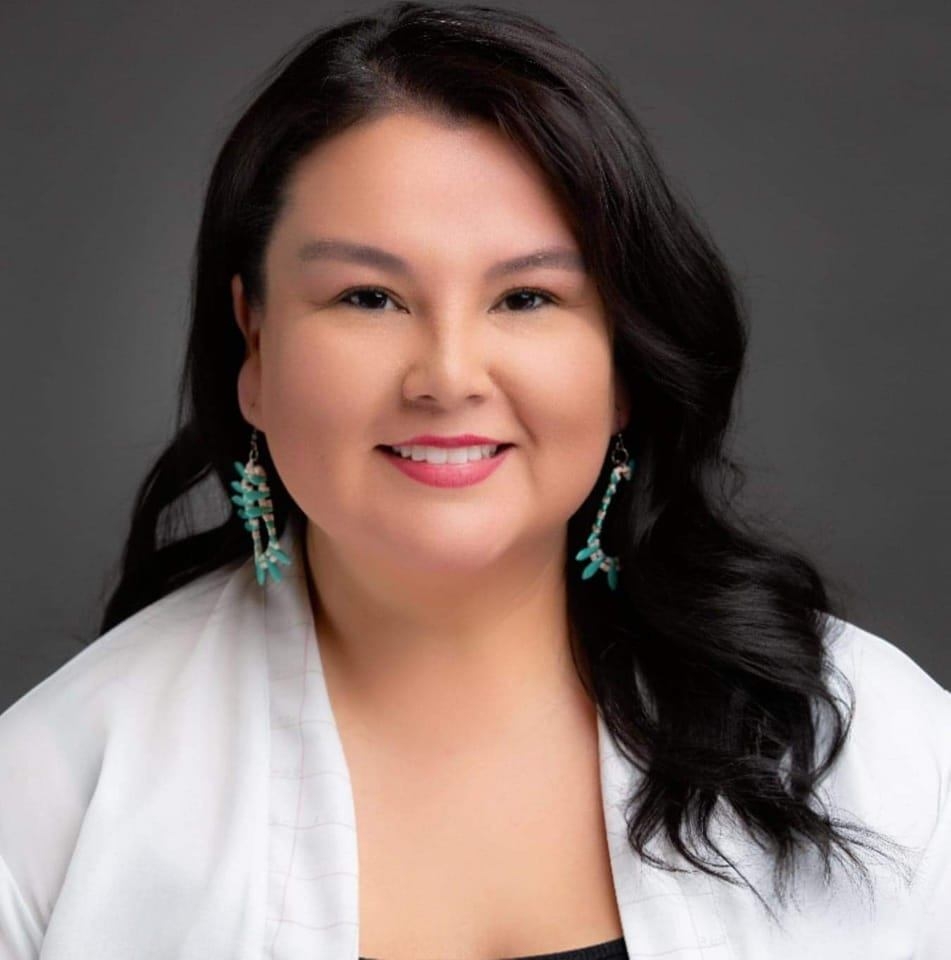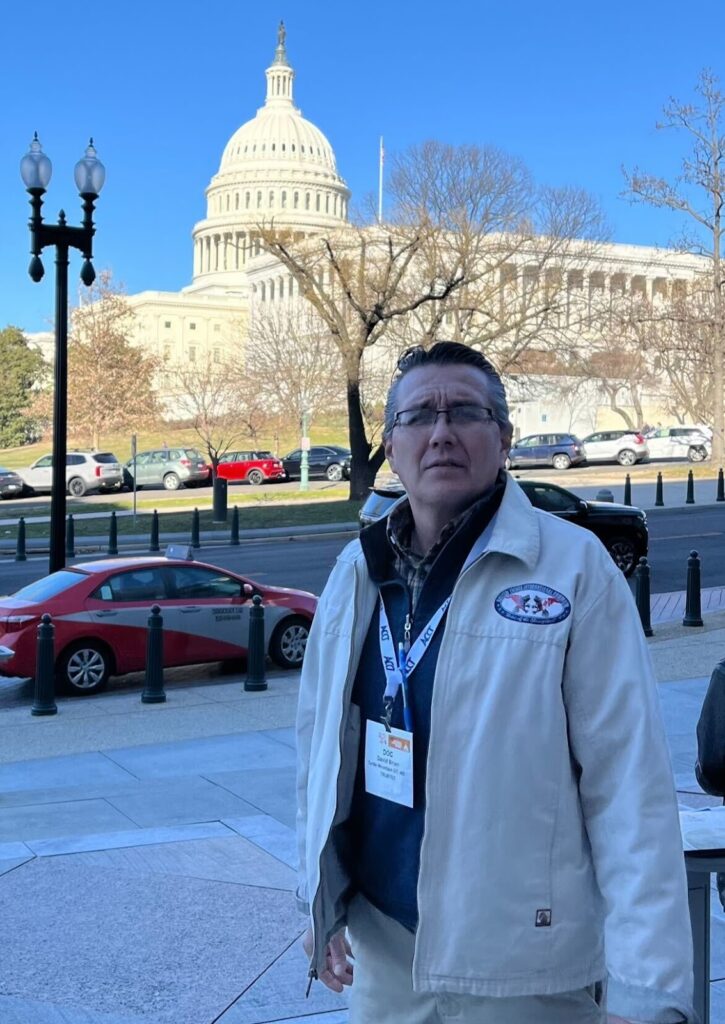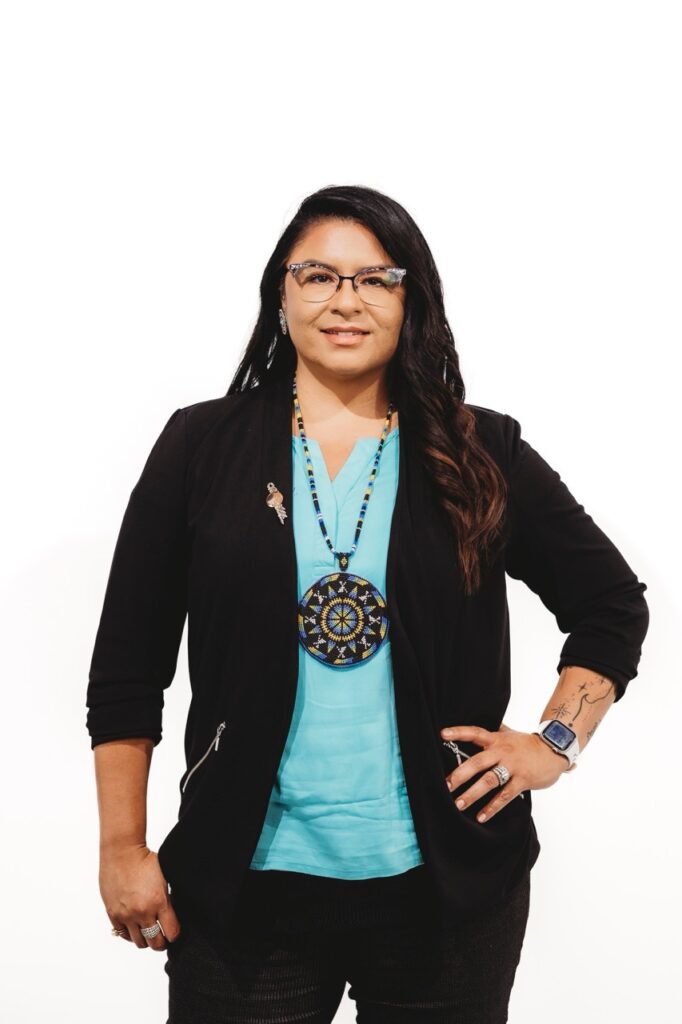Thousands peacefully protest

Courtesy of the North Dakota Legislative Branch
Turtle Mountain and Spirit Lake residents can choose between four Indigenous candidates for state representative in the Nov. 5 North Dakota elections. Buffalo’s Fire succeeded in interviewing three of those vying for the public vote.
The candidates are Jayme Davis (D), David “Doc” Brien (R), Robert Graywater (R) and Collette Brown (D). Graywater did not respond after multiple attempts to reach him. All four election seekers compete for two seats in District 9, including the Turtle Mountain Indian Reservation and the Spirit Lake Reservation.
Davis won the seat and assumed office on Dec. 1, 2022. In 2023, the North Dakota Democratic-Nonpartisan League (NPL) House Legislative Caucus elected her as caucus chair, making her the first American Indian to hold a leadership position in the North Dakota Legislature.
Candidate Backgrounds
Before becoming a state representative, Davis, a Turtle Mountain citizen, worked as a policy analyst and joined the legislative staff of U.S. Sen. Kent Conrad in Washington, D.C., at the age of 28. Davis reflected on that time, saying, “It wasn’t so ‘us versus them’ as it is today,” she recalled. “That’s where I really kind of fell in love with law and policy.”

Davis also co-managed a nonprofit organization in St. Paul, where she collaborated with 23 Native nations on issues related to tribal governance and sovereignty. Eventually, she left the Twin Cities and returned to North Dakota.
“When I moved home during the pandemic, we got redistricted, [and] our reservation was basically District 9A,” Davis said. “Nobody was running for the house seat. And I thought, well, I have the background, I have the experience.”
Political discussions with her brother Scott Davis, the former North Dakota Indian Affairs Commissioner, inspired Davis to run for state representative.
“I’ve always been intrigued by how our representation matters and that we are at the table, even though these bills may not directly say that we are involved,” she said. “We are always involved because this is our home.”
Meanwhile, Brown, a citizen of Spirit Lake, entered the legislative race after experiencing different stages of her life living on and around the reservation. She graduated from Devil’s Lake High School outside the Spirit Lake Nation and later earned her degree from Cankdeska Cikana Community College in Fort Totten. After graduation, she began her career as a wildland firefighter. However, the birth of a child prompted Brown to change her career path.
In 2001, she transitioned into the gaming industry and has since risen to executive director of the Gaming Commission at the Spirit Lake Casino & Resort, located on the Spirit Lake reservation in east central North Dakota. She also serves on several boards, including as chairperson for the Chandaska Chikuna Community Board and as an advisor for Spirit Lake Youth Sports, the North Dakota Native Tourism Alliance and the North Dakota Council of Arts for the region.
One reason Brown is running for public office is to be a voice for her tribe, which has been impacted by redistricting. “I was a part of the redistricting process when it started,” she said. “I went and asked for our tribe to have its own district, and basically, before I even got to speak, a committee member came out to me and told me that, you know, you guys are a minority group, and whatever you’re going to ask for –– it’s not going to happen.”
“The voters of the district have endured many challenges at the polls that I’m tired of it, and I think that they need a champion in the legislature to speak for them,” Brown said. “It’s time for tribes to have their own voice in the North Dakota legislature.”
“I’ve always been intrigued by how our representation matters and that we are at the table, even though these bills may not directly say that we are involved. We are always involved because this is our home.”
Jayme Davis, incumbent North Dakota State Representative District 9
Widening the Distrct 9 legislative candidate race is Brien, also a Turtle Mountain citizen, who has dedicated the past 30 years to working in Indian Country. He spent eight years as the director of the Eagle Project at the University of North Dakota in Grand Forks, followed by four years managing and coordinating tribal programs at Turtle Mountain Community College in Belcourt.
Additionally, he served as the director of development at Saint Ann’s Indian Mission for 10 years. In 2013, he founded Two Hearts Radio KXYM-LP-FM, a Catholic radio station broadcast from Belcourt, serving the Turtle Mountain Indian Reservation, where he is still active on the airwaves. Brien is also recognized for his tenure as the tribal chairperson of the Turtle Mountain Band of Chippewa from 2006 to 2008.
“My purpose in life is to help Native individuals and Native communities,” he said. “All my work over my life has been to help Indian Country.”
After his term as tribal chairman, Brien decided not to seek re-election, preferring to focus on other projects.
“I chose not to run again after that,” he said. “I know you could run again every two years up here; I just chose not to run again [because] I like administrative managerial roles better.”
Although he hasn’t held public office since serving as tribal chairman, Brien wants to become the new representative for District 9. With the new District 9 now including the Turtle Mountain Indian Reservation and Spirit Lake Reservation, he is ready to re-enter the political arena. “This is an opportunity to serve two reservations—that’s why I’m running,” Brien said.
“The voters of the district have endured many challenges at the polls that I’m tired of it, and I think that they need a champion in the legislature to speak for them. It’s time for tribes to have their own voice in the North Dakota legislature.”
Collette Brown, candidate for North Dakota State Representative District 9
Brien’s candidacy comes at a pivotal moment for District 9, as the very shape and composition of the district have been at the center of recent legal battles. The inclusion of the Turtle Mountain and Spirit Lake reservations in District 9 results from ongoing legal challenges surrounding the state’s redistricting efforts. These challenges have significant implications for the candidates and voters alike.
Legal advocates argue that North Dakota’s 2021 redistricting map violates the federal Voting Rights Act, potentially diluting the Native vote. The Native American Rights Fund previously issued a brief highlighting these issues.
In February 2022, the Spirit Lake Tribe and Turtle Mountain Band of Chippewa filed a lawsuit against North Dakota’s legislative map, claiming it unlawfully diluted Native American voting rights under the Voting Rights Act. On Nov. 17, 2023, a U.S. District Court ruled that North Dakota’s 2021 legislative map unlawfully diluted Native American votes in districts 9 and 15 and ordered the implementation of a new map proposed by tribal nations for the 2024 election.
Secretary of State Michael Howe appealed the case to the 8th Circuit Court. On March 14, 2024, North Dakota voters, along with the Turtle Mountain Band of Chippewa and the Spirit Lake Tribe, responded to the Secretary of State’s appeal regarding a court order for a legal legislative map for elections.
Brien, on the other hand, believes that combining what was once District 9A and 9B is a positive thing. “I think it’s a blessing,” he said. “Anytime we can get our tribes and our people to work together I think it’s good.”
Legislative Focus
As he outlines his legislative priorities, Brien highlights key issues that need urgent attention in Indian Country. “One of my main goals for running for office is to help battle the addictions in Indian Country,” he said. “Also there’s problems with human trafficking. I really want to support that recovery center work and then job creation in the light industry are my main goals in running for office.”

Overall, Davis has identified some of her legislative priorities. The first is a bill tackling tribal vehicle taxation that passed last session. “We need a fix,” she said. “Originally, the car dealerships didn’t want to have to drive the cars to the reservation anymore. That was due to liability within what was the original bill… Native Americans who live off-reservation will now be taxed if [they] buy a car.”
The second priority centers on tribal consultation. This proposed bill would require that any legislation directly affecting tribes involve consultations with tribal chairs and the tribes themselves. Whether tribes agree or disagree with the legislation, consultation is necessary before moving forward.
A third priority is the Institution for Mental Diseases waiver, which provides Medicaid reimbursement for recovery centers, specifically for Mental Health America, a national nonprofit, and Turtle Mountain. The fourth would include creating an alert for when Indigenous people go missing.
“I’m going back and forth on that right now because I see the need for it as an Indigenous person and as somebody who recently was part of a search for a missing girl here in the Turtle Mountains,” Davis said.
Like Davis, Brown also aims to prioritize tribal consultation and address the issue of tribal vehicle taxation. “Having true consultation with the tribes is one of the things that we need to focus on,” she said. “A lot of bills get passed through without true tribal leadership.”
“I think it’s a blessing. Anytime we can get our tribes and our people to work together I think it’s good.”
David “Doc” Brien, candidate for North Dakota State Representative District 9
Additionally, Brown aims to introduce a bill that provides free school lunches for students statewide. She connects personally with this initiative, as her kids needed the program.
She recalled how her children sometimes didn’t have enough money in their lunch balance at one point. Sometimes the cafeteria workers allowed them to have food. “However, sometimes they were told, ‘Oh, you gotta put the food back,’ and, ‘you’re not allowed to have it.’ I think free school lunches for all should be just natural in our state.”
Community Engagement
In the last election, Davis sought support from leaders in the Indigenous community. After her election, she made an effort to connect with others through social media and phone calls. While acknowledging that she wasn’t always successful, she emphasized her commitment to community engagement.

“I reached out to the tribal members, tribal chairs and the tribal council,” she said. “I would email, I would call, I would put it on social media. Unfortunately, it’s hard for our people to come and do these things in person.”
Although reaching out to constituents can be challenging with only 80 days of session, Brown is committed to making the effort. She believes that email and phone calls are the most effective ways to communicate, but she is also open to suggestions from the community on providing more frequent feedback.
“I would do my best to communicate back to the people about what’s been going on, what I’ve been going through, what bills are being proposed and if they would pass the Senate or if they pass the House and if they’re at the governor’s desk and what they can do,” Brown said.
Brien plans to engage with the community by attending local events, including high school basketball games, sports matches, powwows, rodeos and horse races, and those at tribal colleges. “Here in Turtle Mountain, we like horse racing, we like roping and we like powwows, so just by going to those events and then interacting with the people at the grassroots level… you will have a broad view of the different issues.”
The former tribal chairman is exploring various ways to gather community feedback on policies that impact his constituents, acknowledging that improvements are needed. “I don’t feel we have too many good mechanisms in that area,” Brien said. He suggests posting on Facebook and other social media platforms to share their thoughts.
One of his ideas is establishing regularly scheduled talking circles to engage with his constituents. “Every couple weeks or start with once a month, you just kind of gather and have talking circles somewhere where you just talk about what’s going on,” he said. “I think just meeting and talking to people is the best way to go versus reading about someone.”
Message to Voters
Brien aims for the leaders and constituents of District 9 to unite and move forward together, regardless of their political beliefs. He believes that community progress is essential. “No matter what our backgrounds are, we have to work together,” he said.
Brown emphasizes the importance of this election and encourages the Indigenous community to go out and vote. “I think we have a crucial time in history right now where we can make our own history for Spirit Lake and Turtle Mountain, where we can have true representation of each tribe at the North Dakota legislature,” she said. “Every vote does count. So we can’t be afraid of the polls.”
Adrianna Adame
Former Indigenous Democracy Reporter
Location: Bismarck, North Dakota
See the journalist pageNorth Dakota redistricting (Turtle Mountain Band of Chippewa Indians v. Michael Howe). Native American Rights Fund. (n.d.). https://narf.org/cases/north-dakota-redistricting-map/
Rep. Jayme Davis First Native American elected to leadership position in North Dakota legislature - dem-NPL party Democrats. North Dakota Democratic-NPL. https://demnpl.com/rep-jayme-davis-first-native-american-elected-to-leadership-position-in-north-dakota-legislature/
Voters and Tribal Nations defend critical redistricting win from North Dakota appeal attempt. Native American Rights Fund. (2024, March 18). https://narf.org/nd-redistricting-appeal/
© Buffalo's Fire. All rights reserved.
This article is not included in our Story Share & Care selection.The content may only be reproduced with permission from the Indigenous Media Freedom Alliance. Please see our content sharing guidelines.
Steve Sitting Bear elected as chairman
This article was produced for ProPublica’s Local Reporting Network in partnership with Honolulu Civil Beat
ProPublica
Inspired by her grandparents, Tonah Fishinghawk-Chavez proves that caring for the community is an action, not just a word
Police and family looking for Angel Mendez and Zayne LaFountain
We paused some services to investigate and restore systems and we’re grateful for your patience







